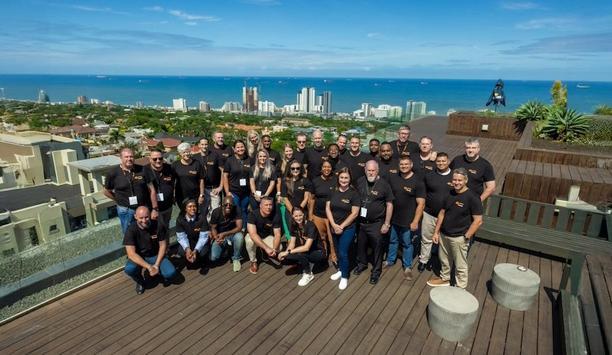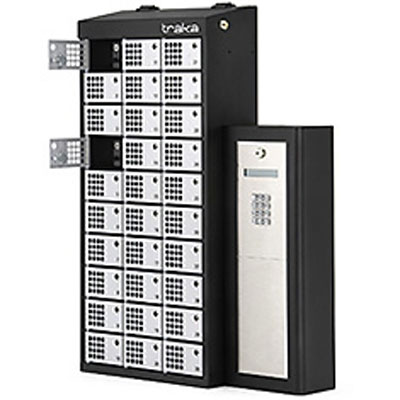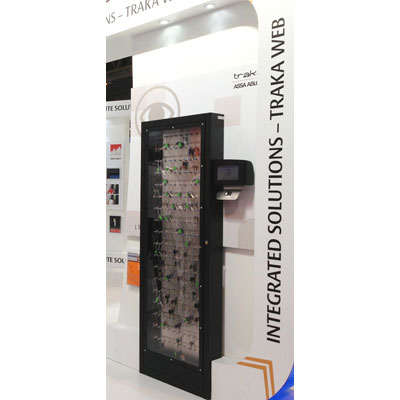Traka - Experts & Thought Leaders
White papers from Traka
Traka key management improves security and health & safety processes
DownloadEffective asset management in retail
DownloadEffective Asset Management in Airports
DownloadSimplifying key management for small to medium-sized businesses and institutions
DownloadTraka key management improves security and health & safety processes
DownloadEffective asset management in retail
DownloadEffective Asset Management in Airports
DownloadSimplifying key management for small to medium-sized businesses and institutions
DownloadTraka key management improves security and health & safety processes
DownloadEffective asset management in retail
DownloadLatest Traka news & announcements
World Trade Centre (WTC) Amsterdam is home to more than 300 companies. The commitment of its security team to providing a safe working environment in WTC’s fixed and flexible offices goes without saying. However, building managers wanted more from their access solution. More than just an office space, WTC Amsterdam has complementary onsite facilities, including childcare, a gym, physiotherapy clinic, bar/café, dry cleaning service and more. Modern digital solution Modern digital solutions would provide better oversight of movement around the building All its facilities must be cleaned and serviced regularly: they sought a more time-efficient way to manage the many contractors and suppliers who come and go every day. They also hoped a modern digital solution would provide better oversight of movement around the building, including usage data to improve maintenance scheduling. For convenience during installation and day-to-day management, they targeted a wire-free solution – for simpler, less disruptive switching of 1,000 doors from mechanical locks to digital access – and intuitive management, allowing for easy changing of individual access authorizations, even at the last minute. ASSA ABLOY’s smart key digital access system With all these criteria in mind, WTC Amsterdam managers decided on ASSA ABLOY’s smart key digital access system, eCLIQ. They upgraded doors from mechanical to digital access simply by swapping the existing cylinder for an eCLIQ device. Doors are unlocked by battery-powered user smart keys, with a typical battery lifespan of 10 years. “Providing these doors with wired access control would be a huge job and become costly. Instead, we opted for the eCLIQ solution,” explains Sander Borggreve, Facility Manager at WTC Amsterdam. Concrete improvements in operations Scheduling is further simplified by storing keys with a Traka key management system The ROI in terms of workflow benefits has been significant. “Granting temporary controlled access to third parties is very easy with the eCLIQ system. We can set access for a certain period of time, but we can also revoke it at any time,” says Sander. Scheduling is further simplified by storing keys with a Traka key management system. After removing a key from the cabinet, authorised team members enter it into the adjacent eCLIQ Wall Programming Device. In seconds, the key is issued with its fine-grained access rights – covering both door-by-door and time validity. eCLIQ system maintenance and operations With the eCLIQ system, WTC Amsterdam gained not only control but also insights into usage and user flows. This data now informs maintenance and operations, reducing the overall Total Cost of Ownership for the solution. “eCLIQ works very pleasantly in practice. My employees are very satisfied with how the keys work,” says Rutger Barendse of D&B The Facility Group, who provides security staff for WTC Amsterdam. “It is easy as pie!” adds Sander.
Award-winning security manufacturer, Gallagher Security is reflecting on the success of its recent Integrate 360 event held in Durban, South Africa. Held at Premiere Splendid Inn Umhlanga, Durban on February 20, the event attracted 65 Channel Partners, End Users, and consultants from across KwaZulu-Natal and wider South Africa to showcase the latest in Gallagher’s innovative technology suite, discuss features and solutions ear marked for the future, and gain insights into the wider security industry, and key trends for the year ahead. Latest innovations and integrations The event provided a total agenda, including learning sessions, displays, live demonstrations Gallagher was joined by a number of their pioneering Technology Partners including ATG Digital, CathexisVision, HID, RunRite Electronics, Stratus Technologies, Suprema, Traka/Assa Abloy, and Turnstar Systems who shared their latest innovations and integrations with Gallagher with attendees. The event provided a comprehensive agenda including knowledge sessions, presentations, live demonstrations and valuable networking opportunities for attendees. Discussions on the future of the security industry Gallagher Security South Africa, Group Operating Officer, Morne Grobler says, “This year’s Integrate 360 event was another success and a highlight of our annual event’s calendar. We value every opportunity to come together with our Channel Partners, End Users, consultants, and members of the wider security industry to share insights, network and participate in meaningful discussions on the future of the security industry.” He adds, “Investing the time to connect with our industry peers and build relationships is a powerful step towards strengthening our regional activity and continuing to unlock even greater value for our customers through the power of our people and our solutions.”
Award-winning global security manufacturer, Gallagher Security is gearing up to showcase the latest from its innovative technology suite at its annual Integrate 360 event in Durban next week. Bringing together Channel Partners, End Users, and consultants from across KwaZulu-Natal and wider South Africa, Gallagher’s Integrate 360 event offers attendees the chance to engage in knowledge sessions, presentations, live demonstrations, and valuable networking opportunities. Latest innovative security solutions Gallagher will be showcasing the latest in its innovative security and access solutions suite Gallagher will be showcasing the latest in its innovative security and access solutions suite and sharing more about their future products and features including the upcoming release of their award-winning site management platform, Command Centre. Additionally, attendees will get to hear from some of Gallagher’s pioneering technology partners including, ATG Digital, CathexisVision, HID, RunRite Electronics, Stratus Technologies, Suprema, Traka/Assa Abloy, and Turnstar Systems. Gallagher’s latest solutions Gallagher Security South Africa, Group Operating Officer, Morne Grobler says, “Integrate 360 is a highlight on the annual events calendar, offering attendees an interactive and informative experience, and showcasing Gallagher’s latest solutions." "Whether you’re interested in engaging knowledge sessions equipped with industry insights, live demonstrations of the latest Gallagher solutions, presentations unveiling the latest cutting-edge products and success stories, or networking with industry pioneers and technology partners, Integrate is a valuable experience for security professionals from across South Africa.” Integrate 360 will be held on February 20th at Premier Splendid Inn Umhlanga, Durban. Registration is essential to secure the spot.
Insights & Opinions from thought leaders at Traka
For bricks and mortar retailers, there’s no going back to how it was anytime soon. Even before the COVID-19 pandemic and economic crisis, they had been fighting a fierce battle against online shopping and significant e-commerce players. The high street has done a pretty good job of evolving over the years. From its humble beginnings in the late 19th century to its boom in the late 20th, it’s constantly adapted to meet changing consumer needs. The risk to retail But, it’s now reported to be at risk. Sales and footfall started to dwindle decades ago. The dawn of internet shopping in the mid- 2000s saw numbers drop even more dramatically. Indeed, we have heard and seen reports repeatedly on ‘the death of the high street.’ Footfall went down to virtually zero, thanks to this year’s nationwide lockdown Making matters worse, footfall went down to virtually zero, thanks to this year’s nationwide lockdown. Even Primark, the international ‘hero of the high street,’ saw their average £650m in weekly sales nosedive to nothing without an online presence. But there is light at the end of the tunnel. Primark for one came back fighting, and is now expected to hit £2bn by the end of the year. "After a period of store closure, we are encouraged by the strength of our sales," it’s owner AB Foods said in its latest trading update. And continued: "In the latest four-week UK market data for sales in all channels, Primark achieved our highest-ever value and volume shares for this time of year." The threat of new restrictions As we come to a ‘pivotal point’ in the fight against COVID, with threats of new restrictions, it’s time to think about what the next generation of our high streets will look like. The current crisis gives us some clues: it’s local, it’s data-driven and it’s tech-enabled. Crucially, it’s proven to work. The digital high street One of the biggest changes the high street has had to adjust to is the digital revolution. New technologies have massively disrupted the way we spend. 82% of consumers now shop online, compared with just 53% ten years ago, with more than half of people aged 65 and over saying they shop online. Age is no longer a barrier. That’s meant that not only have in-store sales dropped, but shopping patterns have become erratic and harder to predict. From opening times to managing stock and staff – everything has had to adapt. We had to pivot quickly to create an online model The issue was exacerbated over lockdown, as consumers had little choice but to shop online. Digital retailers struggled with resources to fulfil orders, case in point was the endless wait times for supermarket delivery slots. But together, we managed to evolve. As nimble businesses, we had to pivot quickly to create an online model that could operate in conjunction with traditional stores, either via click and collect or similar operatives. And now, we are reaping the rewards. Countless high street pubs and restaurants are now allowing customers to order online and finding ways with new openings to take orders online and deliver a table service. It’s undoubtedly an adjustment, and one that will be easier for some to make than others – but those that can establish an omnichannel presence now will be in a strong position for the future. Online versus the high street Historically, in-store has come second to online for a lot of retailers: even those with omnichannel strategies tend to treat the in-store experience like something of a second-class citizen. Now’s the time to change that. The new online stores that have popped up are unlikely to go anywhere, even once lockdown ends. Their success is proof that getting online and in-store more aligned is an opportunity for, not a threat to, the high street. There needs to be the removal of the ‘physical versus online experience’ for brands, and instead blend the two together, which is made possible through mobile technology. Digital transformation grants a huge opportunity for traditional retail. And no better an example than Amazon, the poster child of online retail. Amazon had previously acknowledged the value of a physical retail channel and had opened physical locations for its books and fresh produce business streams. In August 2020, post COVID-19 lockdown, it has continued with its plan to open thirty physical stores in the UK. High street trends Alongside digital, many trends that were perhaps bubbling under the surface of the retail high street have now made their way to the forefront of securing the new landscape. Sustainable shopping has been accelerated by the crisis. In the last couple of years, retailers’ attention has shifted to focus on making their supply chain and working practices eco-friendlier and socially responsible. Lockdown and our post-retail experience has seen a call for shopping and supporting our local businesses Lockdown and our post-retail experience has seen a call for shopping and supporting our local businesses. Shoppers are more engaged with their local high street now and visiting it more than ever before. Motivated by the instinct to protect their local community. Data has also been key to the new high street. This works both ways, as shoppers are now more informed and in control than ever before. The power of smartphones and increased data coverage has lead to simple but powerful capabilities, like being able to run a price comparison quickly and conveniently. Since a majority of consumers now operate with the ‘mobile mindset’, gone are the days when they will settle for what’s available. Surviving in this new world To survive in this new world, data can support creations of compelling omnichannel experiences. It can help to build loyalty based on customer values, wants and needs. And, it allows ways for retailers to understand how customers are moving around the high street to better predict their requirements. Data proves a holistic view of how, where and when customers spend. Knowing where consumers spend time in store and in which department, demonstrates an understanding of their interests and purchasing choices. Knowing these preferences, creates the foundation for any great customer experience. The technology-led high street In theory, with so many different opportunities for the high street, it is not the strongest or the most intelligent who will survive but those who can best manage change. To deliver in practice, retailers need to lay the foundations for more efficient operations, to meet consumer demands quickly, efficiently, and cost (and time) effectively. Technology arguably holds the key to the challenges of raising standards. And it’s in small ways that it can make a difference. For example, instead of keeping customers waiting while members of staff hunt for a charged-up tablet device to look for stock levels or product information, an automated retail asset management solution means this essential knowledge is right at hand. Even seemingly simple processes can be automated to deliver service and improved business efficiency. For example, on average, it takes staff members six minutes to find a key or working device. That is equal to 42 minutes in productivity time every week for each employee, which can cause losses of up to £40,000 a year. This is where an effective key management system minimises downtime and cuts unnecessary costs. Traka is supporting businesses, including Primark and leading department stores, to implement new strategies for the critical control of access to key and equipment, enabling more effective use, and in turn quicker customer response times. Asset management solutions With a fully automated asset management solution in place, valuables such as keys, cash trays, stock and equipment (e.g. handheld scanners) can be monitored and maintained. A full audit trail with real-time reporting means retailers can see exactly who has removed which device, when it was taken and when it has been returned. This results in staff becoming more accountable and equipment being utilised more efficiently, eliminating the need for arduous and costly manual administration. Reshape the bricks-and-mortar infrastructure and breathe new life into the high street By streamlining processes and effectively protecting business assets, Traka supports in-store retail in their ambition to becomes a ripe opportunity to “innovate, delight and create stronger ties with customers.” And become an integral touchpoint in the future of commerce, helping retailers to adapt to the new retail landscape. In summary, there’s the opportunity to reshape the bricks-and-mortar infrastructure and breathe new life into the high street. The industry needs future-focused visionaries who can provide a fresh perspective and reinvigorate bricks-and-mortar retail in the years to come, utilising tools available to them to enhance their proposition to the new post-lockdown consumer.
With the recent news headlines about store closures and the collapse of well-known chains, alongside clear adjustments in business strategy amongst established high street favourites, there is no denying that the UK retail industry is under huge pressure. A recent report suggests growing issues are leading some retailers to increase risk-taking in the supply chain. But here, Steve Bumphrey, Traka UK Sales Director, looks at ways to help retailers embrace the storm, including paying attention to security, management processes and efficient customer focus. Challenges plaguing retail industry It’s been an awful year to date for UK retail if you believe the cacophony of negative headlines about the health of the UK economy and the confidence levels of the UK consumer. The sector is facing huge challenges in dealing with the evolution in on-line and smart mobile retailing The sector is undoubtedly facing huge challenges in dealing with the evolution in on-line and smart mobile retailing. Further concerns include an unwillingness of policymakers to address the changing retail environment and how business rates and general business taxation and regulation is making a difficult situation worse. Supply Chain Risk Report According to the latest Global Supply Chain Risk Report, published by Cranfield School of Management and Dan & Badstreet, those under pressure, are now facing increased exposure to risk if they are forced to cut costs in their supply chain. The report cites data for the retail sector that shows increased levels of risk-taking since Q4 2018, with retailers reporting high levels of dependency on suppliers and indicating a propensity to off-shore to low-cost, high-risk countries where suppliers are more likely to be financially unstable. In-store technology revolution The underlying evolution of technology taking hold of the retail industry and consequential changing consumer behaviour is what is really forcing the industry to step up and act. This is not only in the shift to online and smart mobile purchases, but also with the increased use of technology in store. Self-scanning and checkouts In a bid to enhance the physical shop experience, especially in supermarket outlets across the UK, retailers are increasingly giving customers autonomy with self-scanners and checkouts and need to be able to trust them to ensure an honest transaction. And for the shoppers, this dependency on technology and not human interaction to complete a shop means scanners must be instantly available and ready for use. Many different underlying competing challenges impact the retail industry Compensators At the recent British Retail Consortium’s ‘Charting the Future’ conference, looking at retail crime and security, Dr Emmeline Taylor, a criminologist at the City University of London identified in self -service shops, several new types of ‘offenders’ such as so-called ‘compensators’ including the atypical ‘frustrated consumer’ who, “fully intended to pay but were unable to scan an item properly”, adding to the security challenge. There are clearly many different underlying competing challenges impacting the retail industry. Arguably, the increase in technology and autonomous shopping, where less staff are present (or staff cuts planned) throws up more vulnerabilities, such as the opportunity for store theft. Use of body cameras Staff needs emerging technology such as body cameras to act as a deterrent to crime and keep employees safe Furthermore, staff may need greater use of emerging technology such as body cameras to act as a deterrent to crime and help keep employees safe. In essence, prevention is better than cure, and it’s certainly cheaper. Whether combating crime physically or online, or looking to find ways to counter the high street trends, working together, sharing information and taking a more holistic approach will help the development of a shared language between retailers. Retail banking It is also here where common approaches can help to deliver on efficiencies, in time, resource and budget that can serve to operate right through the supply chain, and minimise, or even negate the need to take any risks. It can even serve to enhance the customer experience, increasing confidence in the shopping environment. Of course, when discussing the high street, it is not just the department stores and chains that are feeling the impact. Well known banks are also having to redefine their priorities and role on the high street, with customers (especially younger generations) demanding a more efficient service than ever before. Well known banks are also having to redefine their priorities and role on the high street Asset protection Leading the way is Nationwide, globally renowned building society, which prides itself on being one of the largest savings providers and mortgages provider in the UK, promoting itself as running purely for the benefit of its customers, or ‘members.’ Richard Newland, Director of Branch & Workplace Transformation at Nationwide said, “Even more than getting a good ‘deal’ from a building society, the quality of our welcome, or our renowned level of service, we make sure our members feel safe with us, enough to trust us with their greatest assets. We are doing everything we can to evolve our business and focus our efforts on providing the best and most secure services that people value.” Key management systems Traka has supported Nationwide with the introduction of dedicated key management systems So committed to its branch network, it has pledged to its 15 million members that every town and city with a Nationwide branch, will still have one for at least the next two years. A bold statement in today’s climate. Traka has supported Nationwide with the introduction of dedicated key management systems, moving its branch network into a more digital system. Keys no longer need to leave site and the audit trail capability has helped to remove the manual paper recording, allowing status of keys to be established instantly, at any time. Changes in retail market This example, together with Traka’s portfolio of high street brands and globally renowned department stores that cannot be named for security reasons, demonstrates the need for retailers to embrace the need for change, both from a product offering and operational running perspective to achieve aspirations of resonating with customers. They also prove the opportunities for success, in an unquestionable difficult market environment. If retailers can listen to customers and respond accordingly, taking into consideration staff safety and security, alongside an ability to respond quickly to personalised enquiries and expectations. This way, perhaps, the current environment can be seen as an opportunity to innovate and embrace technology to form the high street of the future.
Critical infrastructure facilities are vulnerable to many security challenges, from terrorism to natural disasters. Challenges also include vandalism, theft, employee identification and verification, access control, regulations, and the increasing infiltration of connectivity and the Internet of Things. In addition, many critical infrastructure facilities are housed in harsh and hazardous environments, which adds to the challenges to keep employees and facilities secure. The security risks facing a utility, telecom provider or other critical infrastructure facilities can have far-reaching consequences, including major disruption of core services. It’s essential to minimise the risk of any incidents that could disturb operations and lead to a loss of income or fines. Providing security to critical infrastructure often requires incorporating legacy systems, integrating siloed solutions and automating error-prone manual operations. Data capture form to appear here! Locks remain essential CLIQ locking system from ASSA ABLOY can simplify security and workflow for critical infrastructure entitiesAs a tool to address the complex security scenarios facing critical infrastructure, locks are indispensable. In critical infrastructure environments, locks are often required to be resistant to extreme temperatures, dust and toxic substances, fire and explosions. Locks must also perform in environments that are even more challenging, including rain and manipulation. Critical infrastructure facilities can benefit from a high-security locking system that combines electronic and mechanical security; in effect, providing an intelligent combination of both. CLIQ locking system from ASSA ABLOY can simplify security and workflow for critical infrastructure entities. With terrorism posing a serious threat, perimeter fencing, doors and their locks are the first line of defense against potential intruders at installations such as chemical and power plants, gas terminals, oil refineries, utilities, transport, hospitals, research facilities and other major areas which need controlled access. With terrorism posing a serious threat, perimeter fencing, doors and their locks are the first line of defense against potential intruders CyberLock smart keys CyberLock electromechanical lock cylinders and smart keys record access details of who opened, or attempted to open, every lock, providing critical information when investigating a security breach. In addition, CyberLock enables users to instantly add or delete electronic keys. This eliminates exposure due to lost or stolen keys, and also allows users to assign customised access privileges based on time, date, and authority level. CyberLock cylinders are designed to operate in a variety of applications where high security is required, such as entry gates, chemical feed areas, watersheds, and other water sources. The system’s electronic keys cannot be duplicated or copied, and can be deactivated if lost or stolen, thus reducing the risk of unauthorised entry. Key management solutions Traka has been a source of key management solutions, providing asset protection and process controlThe flexibility and protection of key management is another area of improvement that critical infrastructure companies are benefitting from. With multiple facilities sited at different locations, staff can quickly be granted authorisation to access keys with the press of a button, allowing supervisors to adjust their security based on the needs of the business. Because of the customisation ability, the use of key management systems is continuing to grow throughout the utility sectors as assets increase and varying levels of access management can be set through the system. Traka has been a source of key management solutions, providing asset protection and process control for the industry with smart cabinets and lockers integrated alongside efficient software.
Using artificial intelligence (AI) to automate physical security systems
DownloadA modern guide to data loss prevention
Download7 proven solutions for law enforcement key control and asset management
DownloadThe truth behind 9 mobile access myths
DownloadAccess control system planning phase 2
Download







































